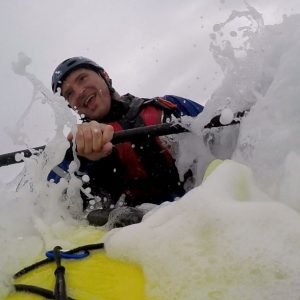 Joe Fullerton graduated from the School of Sustainability with an Executive Master of Sustainability Leadership in May 2017. Fullerton, already working as the Energy and Sustainability Manager at San Mateo County Community College District, decided the one year program was a perfect fit for a full-time sustainability professional like himself.
Joe Fullerton graduated from the School of Sustainability with an Executive Master of Sustainability Leadership in May 2017. Fullerton, already working as the Energy and Sustainability Manager at San Mateo County Community College District, decided the one year program was a perfect fit for a full-time sustainability professional like himself.
In his current position, Fullerton improves sustainability practices in his district, as well as shares ideas and processes with others. In addition to his formal job duties, Fullerton is working to build a network of sustainability professionals – specifically ASU School of Sustainability graduates – working in higher education, in order to bridge the gap between sustainability and higher ed.
Currently, Fullerton's focus is on a sustainable procurement endeavor with fellow ASU sustainability alumnus Briar Schoon, who leads sustainability efforts at Portland Community College (PCC) District. Fullerton explains how his district can utilize a model that PCC has already created to improve its own sustainable procurement efforts. This is the kind of collaboration that Fullerton hopes to foster and spread within his developing network of higher-ed sustainability professionals.
What is your role in this project? How did the School of Sustainability prepare you for this role?
I suppose my role is primarily as instigator-in-chief. I am trying to spark the conversation, to engage others, to empower both others and ourselves and thus enrich our organizations and the educational institution in general.
The School of Sustainability prepared me for this in many ways. It helped me build the network and the confidence, to see the opportunity for change, as well as alerted me to the urgency. It provided the set of tools and systems view that I need to push for change. Without the School of Sustainability and the many people that support it, I would likely have never had this idea, and I certainly would not have the connections, tools or sense of urgency.
What does sustainability mean to you?
Sustainability, for me, is about creating a future where people can thrive in synergistic balance and mutual benefit with their surroundings. Sustainability is not a steady state, it’s not a noun – it's a verb. It requires, and is defined by, intent and action.
In my organization, we define it as, "Raising awareness of the need for social, environmental and economic balance through accessible education, and taking actions that enable future generations to thrive and achieve that balance."
How does a sustainability degree help you to navigate an uncertain future?
The real and pervasive issues that our modern society faces require an emphatic systems view. Understanding the interconnectedness of the world around us and finding the leverage points that will solve manifold problems with the simplest, most direct effort is what is needed. This is what sustainability professionals do. This is precisely how my degree helps me and, more importantly, is helping others by extension.